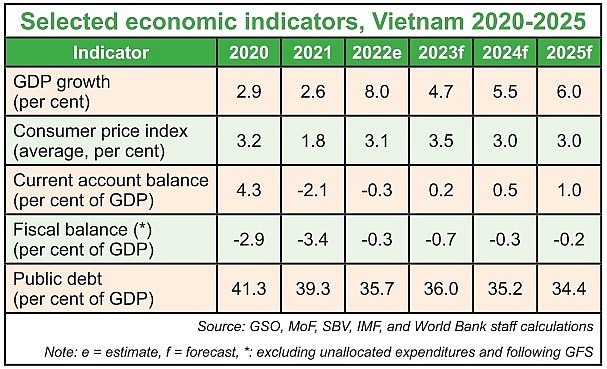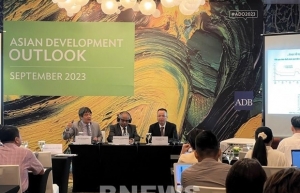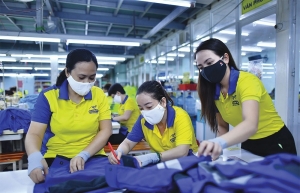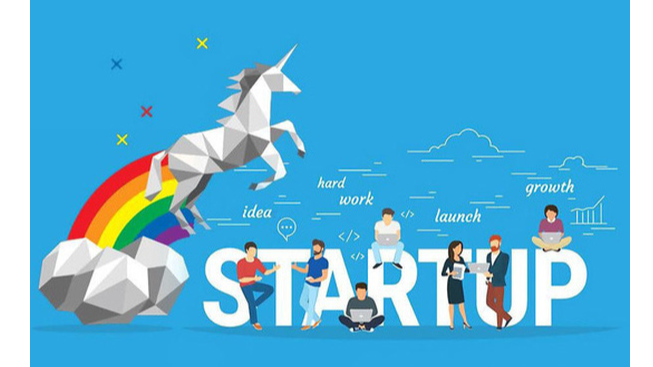Vietnam to consolidate fiscal stance in line with 2030 strategy
According to the World Bank, in Vietnam, while softening, domestic demand is expected to be the main driver of growth in 2023. Private consumption will remain resilient - growing 6 per cent on-year for 2023, albeit slowing below its pre-pandemic growth of 7 per cent on-year in 2019, and contributing 3.4 percentage points to GDP growth.
Overall, investment will contribute 1.8 percentage points to growth. Private investment is expected to remain subdued, growing 4.3 per cent on-year in 2023 compared to 8.2 per cent on-year in 2019 due to uncertainties in the external environment, contributing 1.2 percentage points to GDP growth, the World Bank said.
The fiscal balance is expected to register a small deficit of 0.7 per cent of GDP in 2023.
“The fiscal policy is expected to remain moderately supportive of the economy in 2023 given public investment implementation challenges. Starting in 2024, the government will gradually move back to consolidate its fiscal stance, in line with the financial strategy for 2021-2030,” said the World Bank in its fresh update on Vietnam’s economic situation released last month.
 |
Public and publicly guaranteed debt will remain sustainable, stabilising at an estimated 36 per cent of GDP in 2023 before falling to an estimated 34.4 per cent in 2025, it added. The current account is expected to gradually improve, thanks to a modest recovery of exports, continued recovery of international tourism, and resilient remittances.
The General Statistics Office (GSO) reported that in the first eight months of this year, domestic demand for consumption has shown big signals for recovery. The total eight-month goods retail and consumption revenue in the country reached $170.63 billion, up 10 per cent as compared to the same period last year.
Of which, the goods retail revenue is estimated to be as much as $134 billion, accounting for 78.5 per cent and up 8.7 per cent on-year - in which the price of many important groups of items also increased, such as food and foodstuffs (12.1 per cent), cultural and educational items (11 per cent), garments and textiles (8.7 per cent), home appliances (4.4 per cent), and travelling means (except for cars) up 0.5 per cent.
Also in the first eight months of this year, total capital disbursed from the state coffers is estimated to reach $14.85 billion, equal to only around half of the year’s plan, but up by 23.1 per cent as compared to the same period last year, when the rate climbed 17.1 per cent on-year.
“Consumption demand in the economy is increasing, and it would need more support from the state to continue this trend,” the GSO said. “It is now serving as an important driver of economic growth.”
Nguyen Ba Hung, principal country economist at the Asian Development Bank in Vietnam, told VIR that the demand-side of the economy consists of government spending, private investment and consumption, and net export. So far this year, export and import rates may slow due to global economic woes and they may need more time to strongly bounce back.
“While the country maintained a trade surplus, its export sector relies heavily on processing-for-export and thus suffering a significant hit when export fell by over 10 per cent in the first eight months, although import also dropped by a larger rate, at 16.2 per cent,” Hung said.
According to him, the economy therefore depends on domestic demand as growth drivers, in which the government still has significant fiscal space to boost public spending as a counter-cyclical measure. At present, private consumption is facing the downside of the business cycles. Economic difficulties have forced consumers to tighten their belts, and enterprises also have no opportunities to invest due to weak domestic and external demand.
“Thus, the government now can help boost private demand and consumption via its fiscal policy in which public investment plays a crucial role,” Hung suggested.
Dorsati Madani, senior economist at the World Bank in Vietnam, also stated that given ample fiscal space, fiscal policy should take the lead, ensuring a much better implementation of the investment budget for 2023. “Public investment is expected to increase 9.5 per cent on-year contributing 0.6 percentage points to GDP, but only partially compensating for lower private investment,” Madani said. “With the easing of liquidity conditions and the central bank’s renewed guidance on loan forbearance, financing constraints in real estate/construction are expected to ease.”
 | Vietnamese economy remains resilient despite weak external environment: ADB Despite the weak external environment, the Vietnamese economy remains resilient, and recovery is expected to pick up in the near term, said Asian Development Bank (ADB) Country Director for Vietnam Shantanu Chakraborty. |
 | Export boost paramount for recovery The domestic export landscape is deemed to be on the right tack, but barriers remain up ahead in terms of overseas markets, which have dampened the situation over recent months. |
 | Vietnam's tech startups secure $50 million in funding in Q3 In the third quarter of 2023, Vietnam's tech startups secured a total of $50.1 million in funding—a tremendous 504 per cent increase compared with the second quarter of 2023, according to a report by Tracxn, a leading global SaaS-based market intelligence platform. |
What the stars mean:
★ Poor ★ ★ Promising ★★★ Good ★★★★ Very good ★★★★★ Exceptional
Related Contents
Latest News
More News
- Fitch upgrades Vietnam's long-term senior secured debt instruments (January 23, 2026 | 23:35)
- Fitch Ratings upgrades Vietnam’s senior secured long-term debt rating to BBB- (January 23, 2026 | 16:30)
- Accountants enter 2026 downbeat on global economic prospects (January 22, 2026 | 20:21)
- Korea Development Bank gains approval to open Vietnam branch (January 22, 2026 | 20:14)
- VPBank strengthens auto supply chain finance with Suzuki partnership (January 21, 2026 | 18:14)
- Retail stocks poised for growth as consumption recovery and policy tailwinds align (January 21, 2026 | 10:07)
- Key factors to watch in the stock market in early 2026 (January 20, 2026 | 11:42)
- Dragon Capital Vietnam Fund Management shares debut on UPCoM (January 19, 2026 | 14:47)
- Vietnam’s private capital market enters selective recovery phase (January 19, 2026 | 11:49)
- Vietnam’s credit quota seen as safeguard for banking discipline (January 19, 2026 | 10:00)

 Tag:
Tag:




















 Mobile Version
Mobile Version